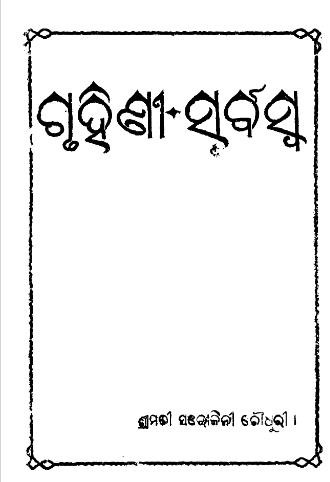Published in 1928, Gruhini Sarbaswa by Sarojini Choudhury stands out as a significant contribution to Odia literature and education. This book is designed as a general knowledge resource targeted primarily at women, aiming to empower them with information that enriches their understanding of the world around them. In an era when women’s education was gaining momentum, Choudhury’s work played a vital role in expanding the horizons of female readers in Odisha.
Gruhini Sarbaswa, which translates to Comprehensive Knowledge for Homemakers, reflects the socio-cultural dynamics of early 20th-century India. Choudhury meticulously curates various topics that encompass general knowledge, ranging from history and geography to science and culture. The book serves as an accessible reference guide, fostering an educated approach to daily life and domestic responsibilities.
Choudhury’s writing style is clear and engaging, making complex subjects understandable for readers who may not have had formal education. Her use of simple language encourages readers to explore new ideas and concepts, breaking down barriers to learning that women of her time often faced.
The strength of Gruhini Sarbaswa lies in its diverse range of topics that reflect the multifaceted nature of general knowledge. Some key areas covered in the book include:
History and Geography: Choudhury offers insights into historical events and geographical landmarks, providing context about Odisha’s past and its place within the broader Indian landscape. This historical awareness enables readers to appreciate their heritage and the significance of their cultural roots.
Science and Nature: The book includes fundamental scientific principles and natural phenomena, encouraging curiosity and critical thinking. Choudhury emphasizes the relevance of science in daily life, promoting an understanding of health, nutrition, and the environment.
Social Issues and Culture: Choudhury addresses various social issues pertinent to women, advocating for education, empowerment, and social participation. By incorporating cultural aspects, she fosters a sense of identity and belonging among her readers, encouraging them to take pride in their heritage.
Practical Knowledge: Understanding the importance of practical knowledge, Gruhini Sarbaswa equips readers with information on topics such as home management, nutrition, and child-rearing. These practical insights serve to enhance the quality of life for homemakers, making the book not just a source of information, but a manual for everyday living.
A central tenet of Choudhury’s work is her commitment to women’s education and empowerment. By targeting her book at homemakers, she emphasizes the need for women to be knowledgeable and informed participants in society. Gruhini Sarbaswa aligns with the broader educational movements of the time, advocating for the idea that educated women can contribute significantly to their families and communities.
Choudhury’s focus on women’s roles resonates deeply in a changing social landscape, where women were beginning to assert their rights and seek education beyond traditional roles. Through her writing, she not only provides knowledge but also inspires confidence and a sense of agency among her readers.
Gruhini Sarbaswa holds a special place in Odia literature, representing a progressive step in the direction of women’s empowerment through education. By compiling general knowledge in an accessible format, Choudhury encourages a culture of learning and curiosity among women, laying the groundwork for future generations.
Books Info
| Books name | Gruhini Sarbaswa / ଗୃହିଣୀ ସର୍ବସ୍ବ |
| Author | Sarojini Choudhury |
| No Of pages | 255 |
| Publisher | NA |
| Publication | 1928 |
| Printed At | The Dutta Press |
| Distributor | NA |

